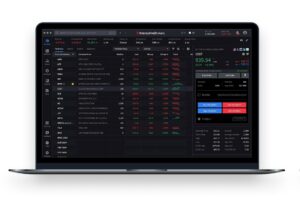FNG Exclusive Interview… The financial landscape is constantly changing, with new challenges and trends emerging rapidly. To gain insights into this dynamic environment, we met with Joanna Frendo, Deriv’s Chief Compliance and Risk Officer.
FNG: Hi Joanna, and thanks for joining us. What are the top challenges for banks and fintech firms today, and how are they impacting innovation and growth?
Joanna: The fintech industry is experiencing numerous challenges. Staying abreast of evolving regulations across different jurisdictions is crucial, demanding constant adaptation and robust frameworks for effective AML, KYC, audit and compliance measures.
Simultaneously, safeguarding sensitive data and ensuring operational resilience in the face of heightened cybersecurity threats is paramount. With the increasing sophistication and frequency of cyberattacks, financial institutions must prioritise robust security measures, safeguarding data privacy, ensuring operational resilience, and mitigating technology-related risks.
Thirdly, the growing adoption of artificial intelligence and machine learning is pushing firms to innovate, invest in cutting-edge technologies, automate processes and personalise customer experiences.
Despite these complexities, innovation remains essential for growth and progress. These challenges, while demanding, push us to rethink traditional approaches, embrace new products or technologies, and collaborate with partners to deliver enhanced value and security to our customers.
FNG: What key trends are shaping the future of financial services, and how is your company adapting to these trends?
Joanna: Embedded finance, powered by advancements in APIs, cloud computing, and data analytics, is blurring the lines between finance and other sectors. This trend, driven by both technological progress and evolving customer preferences, is redefining the financial landscape.
Deriv’s strategy includes actively investing in tech solutions, forging strategic partnerships to expand our ecosystem, and integrating ESG considerations into our core business strategy. We believe that by staying ahead of the curve, we can continue to deliver innovative and responsible financial solutions to our clients.
FNG: The regulatory landscape for brokers, particularly in the FX and CFDs space, has undergone significant changes in recent years. Can you tell us more about upcoming changes?
Joanna: Indeed, the regulatory landscape has undergone significant transformation in recent years and will continue to develop. Its diversity requires fintech companies to navigate a complex regulatory landscape, demanding a nuanced understanding of each jurisdiction’s unique framework.
In the EU, changes are expected by September 2025 regarding MiFID II/MiFIR directives to enhance market transparency, consolidate data sources, and strengthen investor protection. Transaction reporting will expand to include certain OTC derivatives, while the obligation to publish best execution reports may be removed.
The UAE is actively promoting innovation in financial services while ensuring robust consumer protection. Regulators in Africa are prioritising financial inclusion and mobile money innovation, developing KYC/AML frameworks for mobile money providers, promoting interoperability between different platforms, and encouraging the use of technology to expand access to financial services.
Regulatory approaches in the APAC region vary significantly across countries. Some, like Australia, Hong Kong and Singapore, have taken a proactive stance, fostering innovation through initiatives like regulatory sandboxes and supportive policies. Others, like China, have adopted a more cautious approach, prioritising risk management and consumer protection.
FNG: What proactive measures is Deriv taking to prepare for these upcoming changes?
Joanna: At Deriv, we are quite agile and responsive, which helps us effectively navigate the industry’s shifting regulatory transformations. Our team possesses a deep understanding of the nuances within various jurisdictions and across diverse trader segments, allowing us to adapt swiftly to changes and maintain a secure and transparent trading environment.
We proactively engage with regulators and industry bodies, ensuring we remain at the forefront of compliance best practices. Moreover, we are investing in AI-powered tools to enhance our compliance capabilities. This includes automating key processes like KYC/AML checks and transaction monitoring, as well as sophisticated risk assessment and management systems to proactively mitigate potential issues and ensure regulatory compliance.









